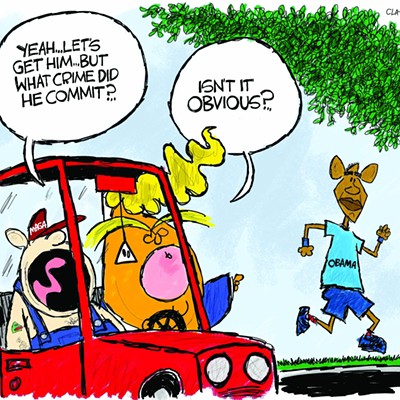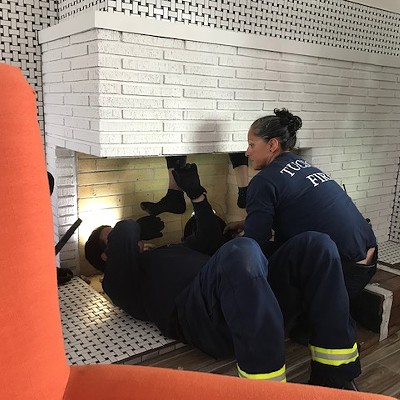He was a young man, with a bright future in real estate sales.
The young man came from a good family. His father and grandfather both served honorably in the U.S. military. And while the young man himself did not have that privilege, he was diligent in observing the duties imposed by his Sunni Muslim religion.
Among those duties: reading holy scripture, being a good provider to one's family, protecting one's spouse in times of threat, and generally striving to do what's right and just in an often unjust world.
The young man's name is Andy Roaché, and a few Weekly readers may recall we told his story a little over a year ago ("Andy Of Nayberry," June 10, 1999).
It was a story about standing your ground in a difficult situation.
In Andy's case, that meant facing down a group of Oro Valley cops who were demanding to enter his apartment at 4:30 a.m.--without a warrant, based on a vague report by a possibly confused woman. The woman had called 911 to state she'd once again heard a woman sobbing in a nearby apartment, Andy's apartment, she thought.
However, another resident of the large apartment complex where Andy and the 911 caller were living at the time told The Weekly there may have sobbing all right, but certainly not from the apartment shared by Andy Roaché and his wife, Helen, whom he described as a quiet, well-behaved couple.
The sobbing had undoubtedly emanated from another apartment in the same block, an apartment occupied by a troubled family, he said. Andy's wife, by the way, said he's never laid a hand on her.
Of course the authorities made the usual argument that the cops should be able to enter a home without a warrant if they honestly believe there's an emergency and someone needs rescuing.
It would be a compelling argument, except for a few small details peculiar to this case:
1) The officer who wound up going through the Roaché's door that night was the same one who, several days before, had stopped Roaché in the apartment complex parking lot and demanded to search his slick-looking black Mustang.
2) There was no apparent reason for the request to search his car, other than perhaps the fact that Roaché was in his late 20s and an African American male living in an overwhelmingly white town.
3) It was a request Roaché had at first angrily refused. He had argued with the cop, but then relented. The search, which involved a specially equipped police van, turned up nothing illegal.
That early morning at his apartment door, Roaché again argued with the cops. He insisted they couldn't enter his apartment, that his wife was fine, and that they were being unreasonable in their demands to enter and look around.
They pushed their way in anyway. Roaché was knocked down, bruised and battered as his wife watched, horrified. They dragged him away and threw him in jail.
The middle portion of this tale is even worse in some ways:
One of the cops involved in the invasion of Roaché's privacy and subsequent humiliation claimed to have received a bloody nose during the arrest. This was to become the basis of a Class 3 felony charge--disfigurement of an officer--for which, were he convicted, Roaché could have served 12 years in prison. Roaché says he can't remember hitting the cop--something he insists he wouldn't do--even accidentally.
The Pima County Attorney's Office also charged Roaché with aggravated assault.
At trial almost a year later, the jury found insufficient evidence to convict Roaché on the disfigurement charge. He was acquitted; the jury hung, five to three, on the lesser charge.
"For a year they let me think I was going to prison for a dozen years," an embittered Roaché told The Weekly. In the meantime, with a felony prosecution hanging over his head, he'd lost his lucrative real estate job, and his wife was forced to move back to Oregon to live with family, because Andy could no longer support her.
There is a happy ending here--if such stories can be said to end happily.
Given the apparent racial persecution, humiliation, physical brutality, emotional turmoil and psychological stress Andy Roaché has been forced to endure over the last two years, however, it's a good bet he doesn't see the outcome as particularly cheery.
The County Attorney's Office, in its sometimes ridiculous and over-zealous urge to prosecute, re-filed the aggravated assault charge in Pima County Justice Court.
But when it came time to go to trial, the assistant prosecutor supposedly handling the case was unprepared. So, at the insistence of Roaché's attorney, Vernon Peltz, the judge dismissed the case with prejudice.
"I feel exonerated. I am exonerated," Roaché said last week from his new home in San Diego. "What's more, I think the state and the system are being forced to take a look at their actions."
Pressure to do so is coming from the civil suit Roaché has filed in U.S. District Court in Tucson. As a result, the Oro Valley Town Council was scheduled to discuss Roaché's case in executive session this week, with an eye to a possible out-of-court settlement.
Whatever the financial outcome, for Roaché the real issue was always one of principle. And to those who supported his fight to live as any other citizen in Oro Valley and to be secure in his own home, he has this message:
"This has been hard, this has been hell. But please tell everybody who assisted me thank you. And if I win, I'm going to send everybody who assisted me double what they sent me. That's really in my heart, and I saved everything from everybody. I'd like to give back to everybody, I really want to say thank you."
And thank you, Andy Roaché, for having the courage to stand up for your rights.












